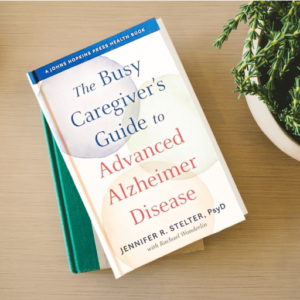Gift Giving to Those with Dementia
The holidays are right around the corner. What do you get mom who is living with dementia? Or perhaps grandpa, sister, or the resident you adopted?
The Dementia Connection Model© is a cognitive-behavioral framework that takes into account how the person living with dementia is progressing through their disease, focusing on what we know works well with advancing dementia – sensory stimulation. When a person with dementia is stimulated using their senses, that information is processed either directly or indirectly in the limbic system of their brain that houses the amygdala (feelings) and hippocampus (memories). When positive sensory-based engagement strategies are used, this can ignite positive feelings and memories, promoting productive behavioral expressions and connections (Stelter, 2021). And when the caregiver is the one providing these positive experiences, the person with dementia will either connect or re-connect with them because they like how they feel with that person.
These various sensory stimuli can be given as holiday gifts, like music for auditory stimulation, pet companions or therapeutic dolls for tactile and visual stimulation, essential oils for olfactory stimulation, their favorite foods for gustatory stimulation, and so on. Let’s dive deeper.
Music (Auditory)
Playing their preferred music has shown to increase lucidity in the moment, improve communications skills, and experience positive emotions, whether for a couple of minutes or a few hours. Therefore, put together some of their favorite playlists, even holiday music you know they love. Play it at the holiday gatherings to influence them to feel calm, happy, safe and secure. Then also give it to them for a great holiday gift – perhaps uploaded on an airpod or music list that caregivers can play for them.
Pet Companions (Visual & Tactile)
The unconditional love of a pet may offer a wonderful connection to someone who may not always be able to fully communicate. Pets also provide visual and tactile stimulation, and they can improve mood and increase physical activity. Furry friends also assist as conversation starters. “Even people with Alzheimer’s recognize a dog, and they see that the dog is someone new in their environment. I think they see it as someone with whom they can interact without any worry,” says Mara M. Baun, DNSc, at the University of Texas Health Sciences Center at the Houston School of Nursing. If it is not possible or appropriate to get a real pet, try a realistic stuffed or animatronic puppy or kitten. When introducing a stuffed or animatronic animal, it is important to let the person you care for lead the way. You can approach them by saying, “What do you think about this?” The answer will likely let you know if they see it as real or not. Some individuals may know it isn’t real and still enjoy it very much. At some point, however, those with dementia may think they are real and enjoy them as if they are their own pets. Watch their eyes light up as they care for them and pet, kiss and snuggle them.
Therapeutic Dolls (Visual & Tactile)
Children light up the world of people with dementia. Depending on the activity they are doing, such as reading or playing a game, the interaction could stimulate all senses. As the disease progresses, using therapeutic dolls may prove helpful. A person with dementia should receive a lifelike 5- to 8-pound infant doll or mannequin to care for and nurture. Most often, the doll brings joy, unconditional love, and purpose while also providing a multi-sensory experience influencing them to feel calm, happy, safe and secure. A person with Alzheimer’s disease may care for a doll as though it is a real baby, providing the person with important daily tasks. Doll therapy may also prompt positive past memories, from when they were parents, and help them feel that they are contributing in a meaningful way. The dolls don’t need to be lifelike in every way, such as wetting themselves or crying, to provide a nurturing experience for someone with dementia. Dolls with closed mouths are preferable, because your loved one won’t feed them as often. Also, try to offer dolls with eyes that open and close, as this may signal to your loved one when the baby is awake or sleeping. Additionally, offer dolls that are similar to your loved one’s ethnicity. To add to the experience, purchase accessories to go along with your gift—doll clothes, bottles, blankets, diapers, and so on. Your loved one or resident will enjoy the doll more by using these tactile objects with their baby. Caring for a doll also provides cognitive stimulation, such as when your loved one is organizing the clothes by color, type, or size. A doll can provide hours of activity and can be used morning, noon, and night.
Aromatherapy (Olfactory)
WIthin the Dementia Connection Model, comes an approach to care called The Perfect Day™. Each part of the day (i.e., morning, mid-day, afternoon/evening), specific olfactory stimuli should be used to encourage positive behavioral expressions and minimize sundowning behaviors. In The Perfect Day method, start in the morning with peppermint and a citrus scent. This helps increase mental clarity while improving mood – great for a morning time regimen; citrus additionally increases appetite. At meal times, citrus scents should be used to encourage eating and keep the ‘mood of the room’ elevated. Then, about 30 minutes prior to sundowning and through the afternoon and evening, lavender should be used to promote a sense of calm and encourage sleep. If the person can still smell and they don’t care for the scents being used, then simply try another essential oil that has the same benefits. Give the gift of The Perfect Day today!
Favorite Foods (Gustatory)
Giving the gift of food is timeless. Choose foods you know they love or even recipe books that include some of their own recipes from the past! To enhance this experience, perhaps as a gift from you to them, have them help you cook or bake some of their nostalgic recipes, so they can reminisce based on the smell and taste of these foods. And you two can bond in something you both may have enjoyed in the past together.
The holiday season should be as joyous as possible for everyone. Buying holistic, positive, sensory-based tools for that special someone living with dementia can enhance the quality of this holiday season for them.
At the Dementia Connection Institute, we are always striving to educate caregivers and professionals to fill their toolbox with lots of tools to be prepared when caring for those living with dementia. When caregivers are educated and prepared, this allows those living with dementia to live freely in their new world, without judgment, controls, and negativity.
Learn more about the above mentioned engagement strategies and more at one of our upcoming seminars. Family caregivers and professionals can become certified as a Dementia Connection Specialist (DCS)! Now offering our seminars virtually and in-person.
The holidays are right around the corner. What do you get mom who is living with dementia? Or perhaps grandpa, sister, or the resident you adopted?
The Dementia Connection Model© is a cognitive-behavioral framework that takes into account how the person living with dementia is progressing through their disease, focusing on what we know works well with advancing dementia – sensory stimulation. When a person with dementia is stimulated using their senses, that information is processed either directly or indirectly in the limbic system of their brain that houses the amygdala (feelings) and hippocampus (memories). When positive sensory-based engagement strategies are used, this can ignite positive feelings and memories, promoting productive behavioral expressions and connections (Stelter, 2021). And when the caregiver is the one providing these positive experiences, the person with dementia will either connect or re-connect with them because they like how they feel with that person.
These various sensory stimuli can be given as holiday gifts, like music for auditory stimulation, pet companions or therapeutic dolls for tactile and visual stimulation, essential oils for olfactory stimulation, their favorite foods for gustatory stimulation, and so on. Let’s dive deeper.




